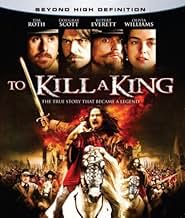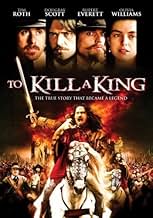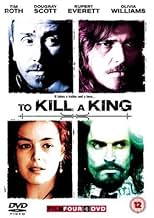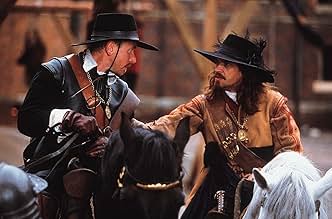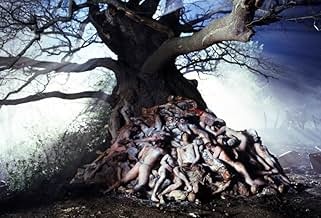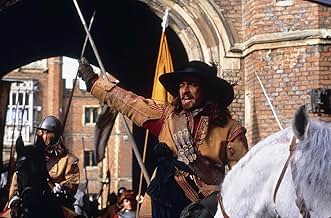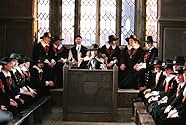IMDb-BEWERTUNG
6,2/10
3520
IHRE BEWERTUNG
Ein Bericht über die Beziehung zwischen General Fairfax und Oliver Cromwell, als sie versuchen, die Folgen der Absetzung von König Karl I. zu bewältigen.Ein Bericht über die Beziehung zwischen General Fairfax und Oliver Cromwell, als sie versuchen, die Folgen der Absetzung von König Karl I. zu bewältigen.Ein Bericht über die Beziehung zwischen General Fairfax und Oliver Cromwell, als sie versuchen, die Folgen der Absetzung von König Karl I. zu bewältigen.
- Nominiert für 1 BAFTA Award
- 3 Nominierungen insgesamt
Empfohlene Bewertungen
Although it presents endless possibilities for costume, action, and worthy 'English' performances, the English Civil War is not a fertile inspiration for films. It has, of course, featured as wallpaper in the 'bodice ripping' genre -'The Scarlet Blade' and 'The Moonraker'come to mind. It also provided the context for the excellent 'Witchfinder General', and the little known and undervalued 'Winstanley'. But there is only one film that comes anywhere near depicting the great and complex panoramic sweep of this period - 'Cromwell'.
I have to tell you that there still is.....for 'To Kill a King' corresponds to that animal most associated with the Puritans across the Atlantic. In short, it's a turkey. Oh, it could have amounted to something, for the ingredients are there if you look hard enough. But it would have helped if the scriptwriters and the director took time out to...well...read a history book.
Now, at this very moment, no doubt, dozens of people will immediately jump out of the woodwork and say 'but it's meant to be entertainment, not a historical documentary!' True enough, and as the credits say at the end, certain events have been altered for dramatic effect. I've no argument with that. If it had kept some sense of proportion, as in 'Michael Collins' (or 'Cromwell' for that matter) I would rest easy. But this film throws out the baby with the bathwater.
The whole of the civil war is reduced to a backdrop for an angst-ridden relationship. There is absolutely no-one else (apart from a pantomine villain) on the whole parliamentarian side, save Cromwell and Fairfax. It's like a seventeenth century version of Cameron's 'Titanic' without the special effects. The mutinous army? The Leveller 'agitators'? The Independent leaders? Not a sign of them! No, Cromwell and Fairfax call all the shots, have the king arrrested etc. etc.
Ah, you say, but that clears the ground for some fine characterisation and acting. Well....not really. You see, the characters of Cromwell and Charles I are absolutely fascinating, and we know so much about them from contemporary sources. In fact, much more interesting than what we get on the screen. The man who desperately wanted a constitutional settlement with the king; who was tolerant of divergent views; and ended up using the army to curb the tyrannical tendencies of the Presbyterian faction of Parliament (an amazing irony, if ever there was one), is depicted as a kind of seventeenth century Trotskyite, the kind of person trying to sell you 'Socialist Worker', complete with the glazed eyes. The man who was devoted to his family, liked music, and loved practical jokes, is played as a humourlous monomaniac. In short, Tim Roth's Cromwell verges on charicature.(At one point, I thought that he had turned into Clint Eastwood's 'Man With No Name', but it could have been the hat.)
Dougray Scott, as Fairfax, is the best thing in it - at least he seems half way believable (though not as a Yorkshireman). Charles I is something else. The real one was refined, courteous, and chaste. Presumably, Rupert Everett must have realised this, as it is evident that he put some time in watching the superb performance by Alec Guiness. (You can almost hear him thinking...'oh..it's about time that I stuttered again!') However this Charles is without charm - slapping his guard, sneering, and flirting with Fairfax's wife.... And then there is Denzil Holles. James Bolan does not appear that enthusiatic - in fact, he almost telephones his lines in.
On a positive note, the film has some moments that are unintentially hilarious. Charles accompanies Mrs. Fairfax on the virginals(?) as she gives a rendering of 'It was a Lover and His Lass'. Cromwell bursts in and starts heaving the furniture around just as they get to the 'hey nonny noes'. We later cut to the Tower of London for some curiously linked vignettes. After a torture session, one of Cromwell's guards hacks off a head for his master's delectation. Charles's Death Warrant is being signed before the trial by this evil lot. All this is done to the accompaniment of a choir of black gowned puritans chanting....no, not a jingle for Quaker Oats, but some strange dirge that is meant to symbolise ascetic intolerance. Yes, folks, nearly all the parliamentarians are sponsored by the breakfast food. Not only is this costume inaccurate, but it's slipshod and boring. After a reconciliation invoving some male bonding, Cromwell suggests Fairfax join him in invading Scotland in the same tone that a mate might propose calling for a curry after the pub shuts.
What else? Did you know that Cromwell pistolled street vendors of Charles I memorabilia? That he wasn't really a General until the war was over?
I'm not really sure who, exactly,this film is aimed at. It won't have the resonance of hokum like 'Braveheart' or 'The Patriot', for the text exposition at the start curves across the screen like battlesmoke. It doesn't have much in the way of action or sex. There aren't any fine dramatic performances. So what on earth were they trying to do?
I have to tell you that there still is.....for 'To Kill a King' corresponds to that animal most associated with the Puritans across the Atlantic. In short, it's a turkey. Oh, it could have amounted to something, for the ingredients are there if you look hard enough. But it would have helped if the scriptwriters and the director took time out to...well...read a history book.
Now, at this very moment, no doubt, dozens of people will immediately jump out of the woodwork and say 'but it's meant to be entertainment, not a historical documentary!' True enough, and as the credits say at the end, certain events have been altered for dramatic effect. I've no argument with that. If it had kept some sense of proportion, as in 'Michael Collins' (or 'Cromwell' for that matter) I would rest easy. But this film throws out the baby with the bathwater.
The whole of the civil war is reduced to a backdrop for an angst-ridden relationship. There is absolutely no-one else (apart from a pantomine villain) on the whole parliamentarian side, save Cromwell and Fairfax. It's like a seventeenth century version of Cameron's 'Titanic' without the special effects. The mutinous army? The Leveller 'agitators'? The Independent leaders? Not a sign of them! No, Cromwell and Fairfax call all the shots, have the king arrrested etc. etc.
Ah, you say, but that clears the ground for some fine characterisation and acting. Well....not really. You see, the characters of Cromwell and Charles I are absolutely fascinating, and we know so much about them from contemporary sources. In fact, much more interesting than what we get on the screen. The man who desperately wanted a constitutional settlement with the king; who was tolerant of divergent views; and ended up using the army to curb the tyrannical tendencies of the Presbyterian faction of Parliament (an amazing irony, if ever there was one), is depicted as a kind of seventeenth century Trotskyite, the kind of person trying to sell you 'Socialist Worker', complete with the glazed eyes. The man who was devoted to his family, liked music, and loved practical jokes, is played as a humourlous monomaniac. In short, Tim Roth's Cromwell verges on charicature.(At one point, I thought that he had turned into Clint Eastwood's 'Man With No Name', but it could have been the hat.)
Dougray Scott, as Fairfax, is the best thing in it - at least he seems half way believable (though not as a Yorkshireman). Charles I is something else. The real one was refined, courteous, and chaste. Presumably, Rupert Everett must have realised this, as it is evident that he put some time in watching the superb performance by Alec Guiness. (You can almost hear him thinking...'oh..it's about time that I stuttered again!') However this Charles is without charm - slapping his guard, sneering, and flirting with Fairfax's wife.... And then there is Denzil Holles. James Bolan does not appear that enthusiatic - in fact, he almost telephones his lines in.
On a positive note, the film has some moments that are unintentially hilarious. Charles accompanies Mrs. Fairfax on the virginals(?) as she gives a rendering of 'It was a Lover and His Lass'. Cromwell bursts in and starts heaving the furniture around just as they get to the 'hey nonny noes'. We later cut to the Tower of London for some curiously linked vignettes. After a torture session, one of Cromwell's guards hacks off a head for his master's delectation. Charles's Death Warrant is being signed before the trial by this evil lot. All this is done to the accompaniment of a choir of black gowned puritans chanting....no, not a jingle for Quaker Oats, but some strange dirge that is meant to symbolise ascetic intolerance. Yes, folks, nearly all the parliamentarians are sponsored by the breakfast food. Not only is this costume inaccurate, but it's slipshod and boring. After a reconciliation invoving some male bonding, Cromwell suggests Fairfax join him in invading Scotland in the same tone that a mate might propose calling for a curry after the pub shuts.
What else? Did you know that Cromwell pistolled street vendors of Charles I memorabilia? That he wasn't really a General until the war was over?
I'm not really sure who, exactly,this film is aimed at. It won't have the resonance of hokum like 'Braveheart' or 'The Patriot', for the text exposition at the start curves across the screen like battlesmoke. It doesn't have much in the way of action or sex. There aren't any fine dramatic performances. So what on earth were they trying to do?
In 1645, after the revolutionary movement of the puritans against the King of England Charles I of Stuart (Rupert Everett), with the leadership of the best friends General Oliver Cromwell (Tim Roth) and General Thomas Fairfax (Dougray Scott), the king is judged and condemned to death by decapitation. General Oliver Cromwell wishes to implement the republic in England, but his monarchist friend Fairfax does not agree, and they break their friendship. Cromwell becomes a dictator, with the title of Lord Protector of the Commonwealth, until 1658, when he is very sick and dies. When I was a student, I had classes about this period of England history, but unfortunately not enough to make any judgement of the historical accuracy of this movie. As far as I remember, the period of the dictatorship of Cromwell was very violent, and it was omitted in the story. As a film, it is a beautiful story of the friendship and relationship of two leaders with different political objectives. The cast and direction are excellent, and the reconstitution of the period is wonderful. I have appreciated and recommend this movie without analyzing the accuracy of the events. If the viewer knows this period of history well, he will have the opportunity to verify its accuracy, otherwise he will a chance to enjoy a good movie. My vote is seven.
Title (Brazil): 'Morte ao Rei' ('To Kill a King')
Title (Brazil): 'Morte ao Rei' ('To Kill a King')
To Kill a King is directed by Mike Barker and written by Jenny Mayhew. It stars Tim Roth, Dougray Scott, Olivia Williams, James Bolam and Rupert Everett. Music is by Richard G Mitchell and cinematography by Eigil Bryld.
It's the end of the English Civil War and with King Charles 1st (Everett) held prisoner by the Parliamentarians, Sir Thomas Fairfax (Scott) and Oliver Cromwell (Roth), friends and colleagues, fall out over the best plan of action for the New England.
A severely troubled production and budgetary constraints left To Kill a King with a mountain to climb just to get acknowledged as a historical epic of worth. Add in the dubious take on this part of English history that so irked the historians, and you would be forgiven for thinking that the film is something of a stinker. Not so actually. For although it's clearly far from flawless, it's a literary piece of work that chooses character dynamics over blood and thunder. Suffice to say that those searching for a battle strewn epic should look elsewhere, but if you have a bent for observations on key personalities involved in war politics during times of upheaval in a period setting? Then this delivers the goods. Well performed by the principal players as well. 7/10
It's the end of the English Civil War and with King Charles 1st (Everett) held prisoner by the Parliamentarians, Sir Thomas Fairfax (Scott) and Oliver Cromwell (Roth), friends and colleagues, fall out over the best plan of action for the New England.
A severely troubled production and budgetary constraints left To Kill a King with a mountain to climb just to get acknowledged as a historical epic of worth. Add in the dubious take on this part of English history that so irked the historians, and you would be forgiven for thinking that the film is something of a stinker. Not so actually. For although it's clearly far from flawless, it's a literary piece of work that chooses character dynamics over blood and thunder. Suffice to say that those searching for a battle strewn epic should look elsewhere, but if you have a bent for observations on key personalities involved in war politics during times of upheaval in a period setting? Then this delivers the goods. Well performed by the principal players as well. 7/10
I was quite excited to see this being a fan of historical films and particularly interested in the Tudor and Stuart periods. The front of the video is presented in exactly the same style as Elizabeth which I thoroughly enjoyed. Elizabeth is relatively well researched and despite some poetic license depicts the early reign well. So this coupled with the acting prowess of Rupert Everett and Tim Roth all boded well. But what a pile of poopie. Over simplified, dreadfully inaccurate, - the list goes on = one of the most interesting periods of English History turned in to a bad Soap Opera. A significant part of the story is Fairfaxes refusal to sign Charles's death warrant. Well ladies and gentlemen in fact he was one of the first to sign. Suffice it to say the lines at the end "And England never again became a republic" (lol) sums up this little piece of filmery.
What seemed to be billed and potentially a good film was for me not only disappointing but inaccurate both in it's historical content but in the tone it set. In general terms it was an enjoyable romp and it portrayed Fairfax reasonably well but Cromwell was sidelined to almost be the butler of Fairfax until he stood aside and Cromwell somehow stood in for him which is completely untrue. A lot of the important events were telescoped into amazingly small time frames almost to get them out of the way to give us an unshaven Fairfax looking gloomy. The Puritans were also treated as ignorant fanatics, particularly Ireton which made me think back to the BBC children's serials of yesteryear where Cavalier = Good, long hair, flashy uniform and Puritan = Bad, poor complexion, bad haircut and BLACK clothes which again a real parody of the actual events. I suppose if you know nothing about the English Civil War and the Commonwealth and Protectorate and like your history served up as soap opera then ok otherwise avoid.
Wusstest du schon
- WissenswertesThe films turbulent production was constantly beset with financial problems & funding went bankrupt twice during filming. the film was only barely completed & eventually released through private investment.
- PatzerIn the opening sequence, Fairfax shoots the sword out of the hand of Cromwell's assassin with a flintlock pistol at about 30 yards range. Such pistols had no rifling at that period and were incapable of nowhere near such accuracy, even in the hands of an expert. To shoot at that range Fairfax would have been more likely to have hit the assassin. Also the bullet struck sparks from the sword hilt when it hit. This is impossible as the bullet would have been a soft lead ball and incapable of creating a spark.
- Zitate
Denzil Holles: At last we all can sleep soundly, knowing that for once the King cannot impose a new tax on us in the morning.
Sir Thomas Fairfax: You make it sound as if you fought the war only to save your profits, Holles!
Top-Auswahl
Melde dich zum Bewerten an und greife auf die Watchlist für personalisierte Empfehlungen zu.
- How long is To Kill a King?Powered by Alexa
Details
- Erscheinungsdatum
- Herkunftsländer
- Sprache
- Auch bekannt als
- Cromwell & Fairfax
- Drehorte
- Produktionsfirmen
- Weitere beteiligte Unternehmen bei IMDbPro anzeigen
Box Office
- Budget
- 14.300.000 $ (geschätzt)
- Weltweiter Bruttoertrag
- 567.471 $
- Laufzeit1 Stunde 42 Minuten
- Farbe
- Sound-Mix
- Seitenverhältnis
- 2.35 : 1
Zu dieser Seite beitragen
Bearbeitung vorschlagen oder fehlenden Inhalt hinzufügen



